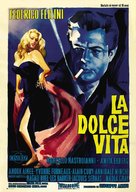Reviews provided by RottenTomatoes
Michael Wilmington, Chicago Tribune: As much as La Strada, 8 1/2 or Amarcord, La Dolce Vita still marks a summit of Fellini and of post-war Italian moviemaking. Read more
David Fear, Time Out: Everything has changed, and nothing has changed. How sour it still is. Read more
Dave Kehr, Chicago Reader: The film was hugely successful and widely praised in its time, though it's really nothing more than the old C.B. De Mille formula of titillation and moralizing. Read more
Eleanor Ringel Gillespie, Atlanta Journal-Constitution: The circus that became the '60s was ushered in cinematically by La Dolce Vita, Federico Fellini's masterwork about the so-called 'sweet life' on Rome's teeming Via Veneto. Read more
Richard Nilsen, Arizona Republic: [An] epic of anomie. Read more
Wesley Morris, Boston Globe: [Fellini's] poetic sensibilities are in full effect. There's also a tremendous soulfulness that roots the movie's depiction of sin in the soil of introspection. Read more
Kevin Thomas, Los Angeles Times: Truly unforgettable. Read more
Lisa Kennedy, Denver Post: Marcello's journey is a string of remarkable vignettes that delivers fashion and sociology in equal measure. Read more
Chris Vognar, Dallas Morning News: It comes from a period in which the filmmaker was perched between neorealism and all-out fantasia. As such, it represents the best of two worlds, even as Marcello can't find contentment in either one. Read more
Stanley Kauffmann, The New Republic: Fellini has set out to move us with the depravity of contemporary life and has chosen what seems to me a poor method: cataloging sins. Very soon we find ourselves thinking: Is that all? Read more
Roger Moore, Orlando Sentinel: It's a comic, cutting and prophetic poem to Rome, movie stars, gossip and the lifestyles we have hungered to know more about ever since the first 'celebrity.' Read more
Roger Ebert, Chicago Sun-Times: The movie is made with boundless energy. Fellini stood here at the dividing point between the neorealism of his earlier films ... and the carnival visuals of his extravagant later ones. Read more
Mick LaSalle, San Francisco Chronicle: It received universal acclaim upon its release in 1960, and in retrospect it's the work that best represents its director. Read more
Time Out: There are perhaps a couple of party scenes too many, and the peripheral characters can be unconvincing, but the stylish cinematography and Fellini's bizarre, extravagant visuals are absolutely riveting. Read more
Variety: Perhaps many spectators will squirm at the three-hour length of the film or of some of its sequences (though director Federico Fellini cut some 30 minutes from his final print), yet others will never notice they've sat that long. Read more
Michael Atkinson, Village Voice: Still a potent, expressionistic launch into post-war Euro-emptiness. Read more

